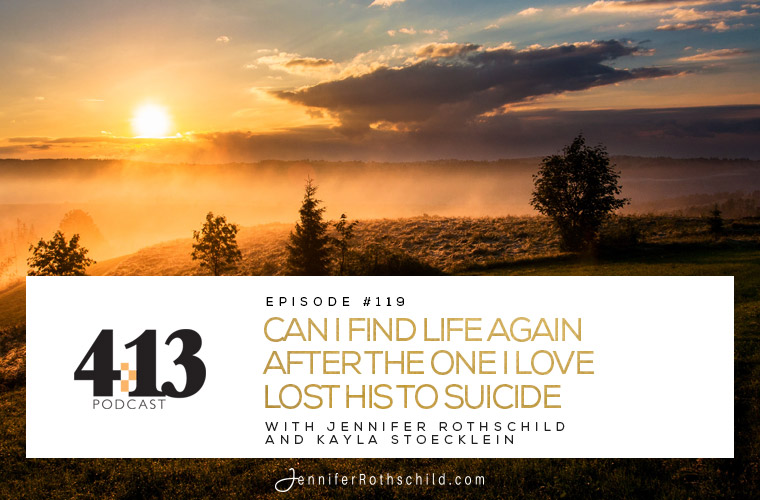
On August 25, 2018, Kayla Stoecklein lost Andrew, her husband and a Southern California mega-church pastor, to suicide. Though her life was shattered, God’s healing is all over her story.
Today, Kayla is the author of Fear Gone Wild: A Story of Mental Illness, Suicide, and Hope Through Loss and an advocate for those confronting mental illness. When she isn’t busy raising her three young boys, you can find her on the beach, sipping an iced coffee, and searching for little glimpses of heaven on earth.
And, in this episode of the 4:13 Podcast, Kayla shares an intimate account of what led to the tragic day Andrew died by suicide and the light she’s found in the darkness. You’re about to experience a powerful and hopeful conversation that you need to hear.
You’ll learn three myths of mental illness and how to overcome them. Plus, you’ll get a rare front-row seat into Kayla’s life and see what it looks like to find your life again, even if someone you love loses theirs to suicide.
3 Big Myths of Mental Illness and How to Overcome Them
- Myth: When you have faith in God, you don’t have suicidal thoughts. As believers, Kayla says that sometimes we think we should never struggle with mental illness because of our faith. We assume that if we’re anxious for nothing and pray about everything, as Philippians 4:6-7 encourages us to do, we won’t ever battle depression or suicidal thoughts. As a result, there’s often a stigma when we do experience mental illness. We may feel like we don’t have enough faith, or we wouldn’t experience this struggle.
How to Overcome Myth #1. Overcoming this myth starts with understanding that mental illness isn’t a sin or a faith issue. It is a real physical illness, and there’s zero shame surrounding that diagnosis. Kayla shares how, after months of experiencing debilitating panic attacks, it was a huge relief for Andrew when he was finally diagnosed with depression. The diagnosis allowed them to start taking steps to help Andrew get better. These steps included taking low-dose medication, talking regularly with the psychiatrist and a therapist, taking time off work to rest, and spending time with mentors and in solitude with God.
- Myth: When you die by suicide, you don’t go to heaven. A second misconception is that when a Christian dies by suicide, that individual doesn’t go to heaven. Kayla says that many assume suicide is a straight ticket to hell or an unforgivable sin.
How to Overcome Myth #2. To overcome this myth, we start by remembering what a believer’s acceptance into heaven depends on—and it isn’t on how someone dies. Instead, it’s on his or her relationship with Jesus. Kayla says that she used to believe this myth herself. She’ll never forget sitting in Andrew’s hospital room and asking her mother-in-law, “Will he go to heaven?” Her mother-in-law responded by reminding her of Andrew’s trust in and relationship with Jesus.
- Myth: Suicide is an act someone commits. We often use the phrase “committed suicide” when talking about someone who dies by suicide. But the word committed has a negative connotation. It points to a decision and is also often attached to phrases like “committed sin,” “committed murder,” or “committed a crime.” Kayla explains that this totally ignores the fact that suicide is often the result of an underlying mental illness. If someone has a heart condition and experiences a heart attack, we wouldn’t say that person committed a heart attack. So dying by suicide is the same. Words like committed or decision are the wrong words to attach to suicide.
How to Overcome Myth #3. Our words matter. So, instead of saying someone “committed suicide,” we can say he or she “died by suicide.” It sends the message that the death was caused by a mental condition, not by a decision. Kayla says that when we pay attention to the words we use to describe mental health issues, we open the door for our loved ones to feel brave enough to speak up, step out, raise their hands, and say that they need help. If we want to save lives and break the stigma, we have to choose our words wisely.
Friend, no matter what or who you’ve lost, you can build a beautiful life again. As Kayla shared, while the pain won’t go away, the grief will grow smaller and tap the pain button less and less often.
So, although today’s feelings are heavy and real, they aren’t allowed to be a team of fiction writers for your future. You will not always feel this way. Kayla proves it. Through Christ’s strength, you can rebuild.
Until next week, may the God of hope fill you with all joy and peace as you trust in Him, so that you may overflow with hope by the power of the Holy Spirit.
Related Resources
Books and Bible Studies by Jennifer Rothschild
- God Is Just Not Fair: Finding Hope When Life Doesn’t Make Sense
- Missing Pieces: Real Hope When Life Doesn’t Make Sense Bible Study
More from Kayla Stoecklein
- Visit Kayla’s website
- Fear Gone Wild: A Story of Mental Illness, Suicide, and Hope Through Loss
- Follow Kayla on Instagram
Links Mentioned in This Episode
Stay Connected
- Don’t miss an episode! Subscribe to the 4:13 Podcast here.
- Were you encouraged by this podcast? Reviews help the 4:13 Podcast reach more women with the “I can” message. Click here to leave a review on iTunes.



